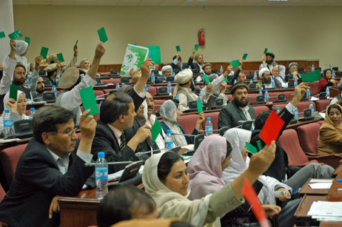- About
- Topics
- Picks
- Audio
- Story
- In-Depth
- Opinion
- News
- Donate
- Signup for our newsletterOur Editors' Best Picks.Send
Read, Debate: Engage.
| located: | Afghanistan |
|---|---|
| editor: | Shadi Khan Saif |
A few weeks into the longstanding parliamentary elections in Afghanistan, and the country, with ever-widening economic disparity, is witnessing extravagant spending by the very rich on electoral campaigns, thus mocking the poor and luring the voters.
Afghans are preparing to go to the polls for a new parliament in October. And for the campaigning season, the country’s electoral commission has set out regulations in terms of campaign and spending. But the Kabul government seems utterly unable or unwilling to devise and implement a mechanism that will hold some candidates accountable for the enormous assets they have accumulated in a very short time frame and with no trails of paid taxes.
Some movements from the Kabul government, for instance, are not allowing politicians with known track-record of different crimes to contest in the upcoming polls. But without an absolute zero tolerance to a lack of transparency and financial accountability for those seeking powerful positions in the government, the country will not be able to overcome bumps and glitches in the path to a functional and peaceful democracy.
Although Afghanistan has moved ahead from a time when the government officials were known for moving bags full of dollars from the capital, Kabul, to provinces for administrative purposes of a functional banking system, the successive governments in Kabul, as well as the country’s western backers (led by the U.S.), have so far not shown a keen and determined interest in financial accountability.
The so-called political elite is seemingly busy throwing lavish dining parties in their constituencies and paying potential voters with cash or other materials, as was reported before the official campaign was yet to be launched.
But there is some hope. Among the tried and tested faces that have a monopoly over the power distribution in the country, there are a few fresh faces from the emerging middle class with a clean background. These polls should not be taken for granted, not by the Afghan society and not by the Kabul government, as it would shape the destiny of the country at a crucial juncture when foreign military power and financial aid is in risk of further dwindling away.
Afghanistan took off with a shaky start in 2014, with a troubled presidential election bruised by allegations of gross irregularities that resulted in the formation of a divided and weak government. The country simply cannot afford the society of the newly rich and corrupt to undermine the democratic future of a country that has already suffered enough.
Photo: The Asia Foundation’s Governance Program in Afghanistan
